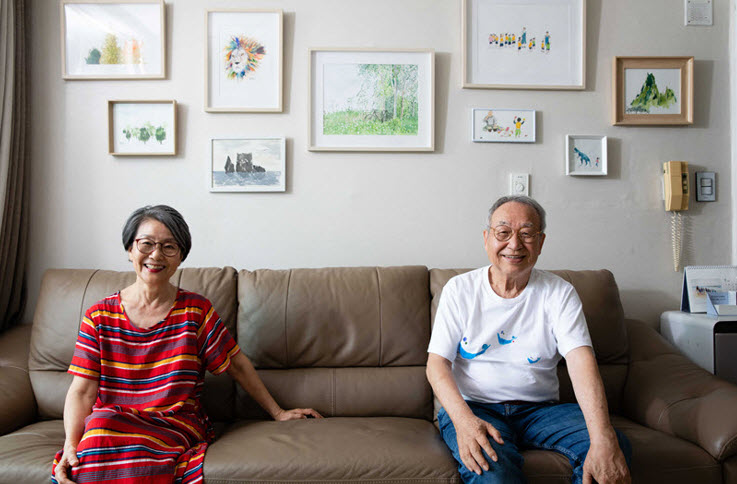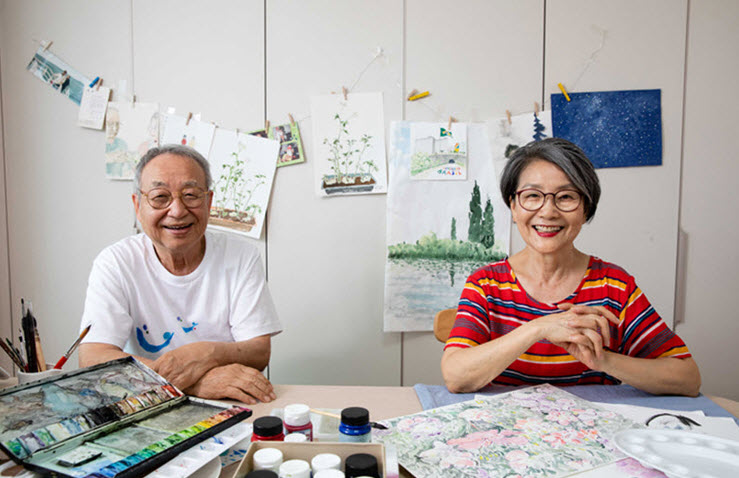SNU alumni couple Kyung Ja Ahn (Department of Korean Education, Class of ’61) and Chan Jae Lee (Department of Earth Science Education, Class of ’61) are the winners of the 2019 Webby Award in the Art and Culture category. They beat out stiff competition including the Sydney Opera House and the Tate Museum, winning both the main award and the People’s Voice award, which is voted on by the public. They won the award for their Instagram account (@drawings_for_my_grandchildren), which features inspirational drawings dedicated to the couple’s four grandchildren. Their acceptance speech paid homage to “all grandparents and their children.”

Kyung Ja Ahn (Department of Korean Education, Class of ’61) and Chan Jae Lee (Department of Earth Science Education, Class of ’61)
How an elderly couple in their seventies became influencers
The couple met in 1963 through a campus exhibition held by the SNU College of Education, where Lee illustrated a poem written by Ahn. More than 50 years later, they continue to draw and write together as grandparents to four grandchildren. Their Instagram account started as a passion project, a legacy that they are leaving for their grandchildren to get to know them better through their lasting art. The couple posted Lee’s first drawing on Instagram on April 2, 2015. Since then, they have been trying to upload one drawing a day, with corresponding letters to their four grandchildren written by Ahn. At the bottom of each painting, he writes “for AAAL,” in reference to his grandchildren’s names Arthur, Allan, Astro and Lua.
The 1000 posts made so far on their feed are filled with everyday stories, such as the scenery of the park in the early evening and reminiscences of their college days, but they also shed light on the custom of ancestral rites at Chuseok, the fear of going through the Korean War, the story of King Sejong and the creation of the Korean alphabet, Hangeul. The impact of their heartfelt posts have been far-reaching, drawing fans and publicity from around the world. The account has garnered over 350 thousand followers, and they have been featured in international news outlets such as the BBC, NBC and The Guardian, with thousands of comments varying in language but united in their message — “thank you for sharing this story… they remind me of my own grandparents!”
Ahn and Lee recently took the stage at a public diplomacy lecture held by the Korea Foundation, a non-profit public diplomacy organization established by the Ministry of Foreign Affairs. “I’ve never thought much about diplomacy before, and the phrase public diplomacy is new to me. We simply drew our customs and history to show our grandchildren, but people around the world showed us great sympathy. Only then did we know that what we were doing could be public diplomacy,” Lee said. “We are living in a day and age where family solidarity has faded all over the world. But I guess our efforts to leave our story behind online, and through it exchange affection among our own family resonated with people regardless of their nationality,” Ahn said.

Chan Jae Lee (Department of Earth Science Education, Class of ’61) and Kyung Ja Ahn (Department of Korean Education, Class of ’61)
We are only here today because of our traditions
The couple, both teachers, emigrated to Brazil with their two children at the age of 40 in 1981. Although she expected to live a different life from the one she had in Korea, Ahn became a Korean teacher in Brazil as well. She could not refuse the opportunity to teach the Korean language and culture at the newly established Korean school in São Paulo, at which she later served as the principal. During her time at the school, Ahn taught second- and third-generation Koreans as well as Brazilian children, and was even honored by the President for her contributions to the Korean community in 2017.
“Having taught my mother tongue in a foreign country, I have come to look back objectively on the history of the Korean Peninsula. How we Koreans ended up all over the world, and how we continue to eat Korean food and learn Hangeul from lands far away. Our history lives on — tradition doesn’t fade, it just changes,” Ahn said.

Gangkang Suwollae (Left), Malttukbakki (Right)
When Ahn and Lee returned to Korea after 36 years in Brazil, they returned to a Korea dramatically changed. For the couple who would hoist the Korean flag on every national holiday even in Brazil, they felt the lack of community spirit in Korea today has been disappointing. This led them to post about the meaning of the March 1st Movement on their Instagram this year, urging not only their grandchildren but also the audience in the caption to “know how our country has walked thus far.”
“It’s not always easy to find material to post on social media. However, I’ve always thought that education is teaching through actions rather than through words. Children learn to judge right from wrong by observing adult behaviors,” Lee said.
The couple, now in their 70s, reject the stereotype that they are an outdated generation. They continue to communicate with the trends of the time, while simultaneously reflecting on our traditional values. And through their drawings and writings, we all are inspired to do the same.
Main Source: http://www.snu.ac.kr/news?bm=v&bbsidx=126526
Written by Minju Kim, SNU English Editor, minjukimm@snu.ac.kr
Reviewed by Professor Travis Smith, Department of Asian Languages and Civilizations, tlsmith@snu.ac.kr

